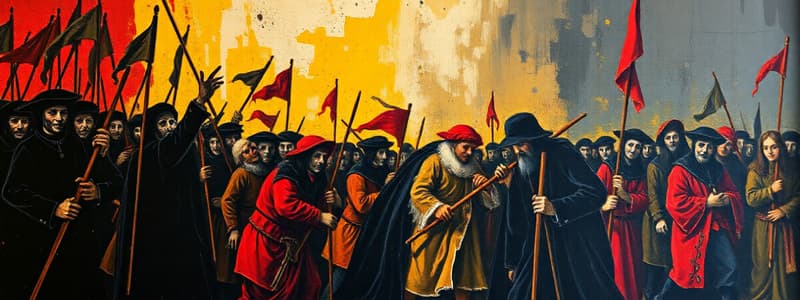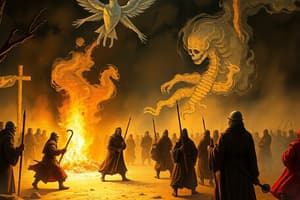Podcast
Questions and Answers
What was a significant economic consequence of the Black Death in England?
What was a significant economic consequence of the Black Death in England?
- The population increased, causing labour to become plentiful.
- Labour shortages led to a rise in the price of bread.
- There was a rapid fall in agricultural prices due to low demand. (correct)
- Wages decreased while bread prices rose.
What role did John Wycliffe have in the Lollards Movement?
What role did John Wycliffe have in the Lollards Movement?
- He supported the lavish lifestyle of the clergy.
- He was a key figure promoting religious corruption.
- He initiated an armed revolt against the monarchy.
- He denounced corruption and sought to revive true Christianity. (correct)
Which of the following was a direct cause of the Peasant's Revolt in 1381?
Which of the following was a direct cause of the Peasant's Revolt in 1381?
- Wealthy landowners reducing their holdings dramatically.
- Corruption in the Church as highlighted by the Lollards.
- A sudden increase in agricultural production.
- High taxation imposed to recover losses from the Hundred Years' War. (correct)
What was a key social impact of the Peasant's Revolt?
What was a key social impact of the Peasant's Revolt?
Which of the following best describes the response of wage-earners to legislative efforts controlling wages post-Black Death?
Which of the following best describes the response of wage-earners to legislative efforts controlling wages post-Black Death?
What was one of the main social tensions created by the Black Death?
What was one of the main social tensions created by the Black Death?
Which of the following was a reaction by wage-earners to attempts at wage control after the Black Death?
Which of the following was a reaction by wage-earners to attempts at wage control after the Black Death?
What was a significant cause of the unrest that led to the Peasant's Revolt in 1381?
What was a significant cause of the unrest that led to the Peasant's Revolt in 1381?
What characterized the state of the Church during the time leading to the Lollards Movement?
What characterized the state of the Church during the time leading to the Lollards Movement?
What effect did the population decline from the Black Death have on agricultural prices?
What effect did the population decline from the Black Death have on agricultural prices?
Flashcards are hidden until you start studying
Study Notes
Black Death (1348 - 1350)
- The Black Death was a devastating pandemic that killed approximately half of England's population between 1348 and 1350.
- This event led to significant economic shifts, including a decrease in agricultural prices due to low demand and a shortage of laborers.
- The price of labor increased, while the price of bread decreased.
- The English government attempted to control wages through legislation.
- In response, wage earners migrated to remote parts of the country to avoid these regulations.
Peasant's Revolt (1381)
- The Peasant's Revolt of 1381 was led by Wat Tyler, Jack Straw, and John Ball.
- The primary cause of the revolt was excessive taxation levied on peasants to cover the financial burden of the Hundred Years War.
- This taxation exacerbated the existing socio-economic tensions between the wealthy and the peasants, who were struggling to pay due to labor shortages and low demand.
- The revolt was a social upheaval that challenged the foundations of English society, driven by the stark contrast between the luxurious lifestyle of the King and his courtiers and the hardship faced by ordinary people.
Corruption in the Church: The Lollards Movement
- The Church experienced widespread corruption during this period.
- John Wycliffe, known as "the morning star of the reformation," and writers like Langland and Gower openly criticized this corruption.
- They aimed to return to true Christianity through their teachings.
- The Lollards Movement directly influenced subsequent reform movements.
Black Death (1348-1350)
- The Black Death, a devastating plague, wiped out approximately half of England's population within a short period.
- The plague caused a dramatic shift in the economy. Labor became scarce leading to a surge in wages, but the simultaneous decrease in demand resulted in plummeting agricultural prices and cheaper bread.
- In response to the economic upheaval, the government attempted to regulate wages through legislation.
- The diminished workforce and the economic upheaval created anxieties leading to social unrest and movements trying to escape poverty.
Peasant's Revolt (1381)
- The Peasant's Revolt, led by figures like Wat Tyler, Jack Straw, and John Ball, erupted in 1381 due to high taxation imposed on peasants to cover the costs of the Hundred Years' War.
- The financial burden on peasants was exacerbated by labor shortages and low demand, making it difficult for them to pay their taxes despite the fact that the royal court enjoyed a lavish lifestyle.
- The revolt represented a widespread social upheaval that challenged the foundations of English society.
Lollards Movement
- The Lollards Movement emerged as a response to rampant corruption within the Church.
- John Wycliffe, a prominent figure known as "The Morning Star of the Reformation", and poets like Langland and Gower openly criticized the Church's corruption.
- Their aim was to revive true Christianity through their teachings and reforms.
- The Lollards Movement significantly contributed to the later Reformation movements.
Studying That Suits You
Use AI to generate personalized quizzes and flashcards to suit your learning preferences.





